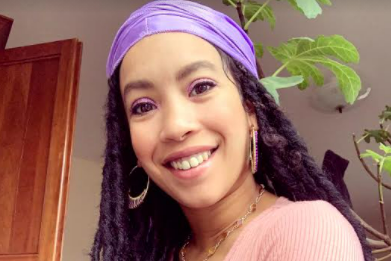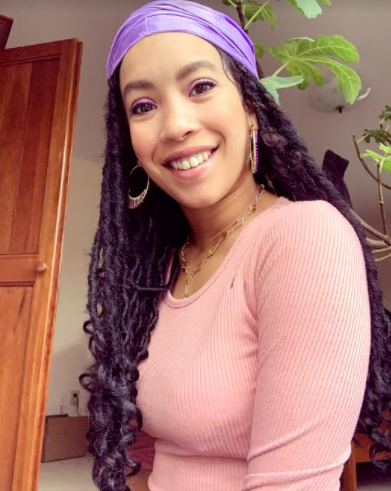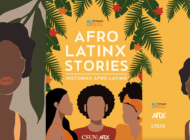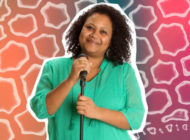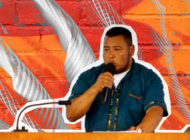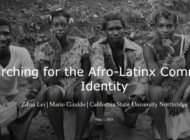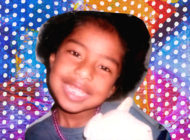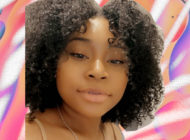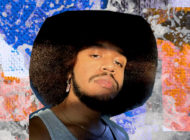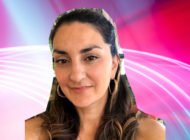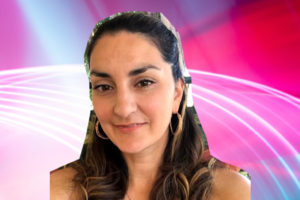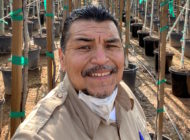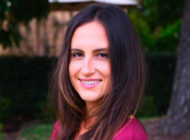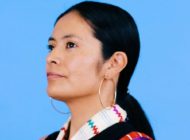Afro-Domincan Julianna Luna Vázquez recalls her journey to loving her afro-latina identity, acting, and music.
By JAZMIN NAVARRETE
EL NUEVO SOL
When she was four, her mother sent her to Dominican Republic to spend time with her paternal grandmother. She describes a memory she has of sitting on her grandmother’s lap in her country home, a home without a roof.
Afro-Dominican Singer and Actor, Julianna Luna Vázquez, 29, from Connecticut, is proud of her Dominican roots.
“I go by Afro-Dominican because I really love to represent my Dominican roots,” she said.
Vázquez’s parents are both from Dominican Republic. Her family lived in Meriden, Connecticut, where she grew up. She has two brothers and one sister, and four older half-sisters from her father’s first marriage.
Her older sisters lived in New York, so she spent a lot of time there growing up, and is why she lives there now, in Hudson Valley.
Growing up, keeping her culture alive was easy because her parents owned a Dominican restaurant in Connecticut. They opened it when she was around six.
“So very much food is the center of culture for me. I spent so many nights in the kitchen hanging out in the supply room basement, it was my playroom for a long time because my mom was always cooking and always working, my parents were always working for their restaurant,” Vázquez said.
Her parents then opened a bar and with it came nightlife and performers and huge parties with her family and music, and music became a big thing for her.
“So much of my culture was my family and gathering with them. It was all about the food, the music, and the family. Those were the central pillars of my culture,” she said.
Language was also important. Her parents were diligent in wanting her to speak Spanish. They only spoke Spanish at home and she wasn’t allowed to speak English at home.
“It was a distinction, the world that I lived in at home was so different from the world that I lived in outside of my home, my home was a mini–Dominican Republic,” She said.
Spending time in D.R is very important to her.
One thing she feels she missed out on is living in D.R. At one point, her parents sent her brothers there for a year of high school. They lived with their grandma and Vázquez felt jealous. When parents were deported, her younger sister moved out there with them, so she also got to live there.
“They got to live in D.R. and live this beautiful life, and be immersed in Dominican culture. That’s something I feel I missed out on, that attachment to the motherland of ‘I’ve lived here these are my people’,” she said.
The time spent in D.R. made her aware of the class differences between herself living in the United States and her cousins growing up in Dominican Republic.
“For them so much of what I lived was perfect, but I loved life in D.R., I loved going to D.R. when I was a kid because it just made everything more special. It’s always been such a relief when I get there like ‘Ugh I’m with my people.’ When I’m in D.R. I definitely feel at home,” Vázquez said.
At the same time, she fears D.R. because of the danger against women. She has to be aware, safe, and conscious.
“I’ve always had that contradiction of loving my land, but also being scared of it, feeling unsafe, and feeling unsure of my place in D.R.,” she said.
It wasn’t until she got older that she realized she wanted to create a space for herself in D.R.
On one of her recent trips, she went for a month and a half. She performed, met musicians, and established herself more as an artist.
“That shifted my perspective of what my home land was and the possibilities and opportunities that it has. I didn’t think D.R. was a place where I could thrive as an artist. It wasn’t until I got older that I thought of D.R. in that way. This is a place of opportunity for me as well. This isn’t just a disenfranchised poor country, this is a source of my people, these people are brilliant, and talented, and artful, and they deserve just as much attention,” she said.
It was then she thought about wanting to feel more of an ownership of her motherland. She would like to own land in D.R. and have a house and wants to make sure her kids have roots there as well.
Her parents were deported 10 years ago and right now she’s in the process of applying for mother’s pardon.
They left when she was 19. Around that time, she was doing volunteer work before going to college. Her plan was to go home and go to community college and then transfer, but she came back and couldn’t stay home because of her parents’ deportation.
“To me it was like, is this really the last time my father will be on American soil? will he really die in D.R. without ever coming back?” she said.
She only sees them when she visits, but she has to save up the money, and gets time off. And because of Covid-19, it’s been two years. Because of covid it’s been 2 years.
“It changed my whole life, I wouldn’t be the person I am today if that hadn’t happened,” she said.
Her time in middle school and high school made her confident in who she is and how she looks.
“I wasn’t black enough for the black kids, but I wasn’t white enough to hang with the white kids,” she said.
She feels like she was bullied out of hanging out with the black kids and that’s when she started hanging out with the white kids. She got into theater, something she always wanted.
Lines couldn’t be blurred after she started hanging out with them, she would get bullied with comments of her thinking she was white. She would get weird comments about her hair from the white kids. Comments that would remind her that she didn’t belong in either.
“I was never enough for either of them and I still feel that way sometimes. There are some spaces where I don’t feel Latina enough, or Dominican enough, or Black enough, because I’m a mixture of all of them,” she said.
In 7th grade she started hating the fact that she wasn’t white and hated that her hair was curly.
She was a part of cheer her freshman year, which she feels was a big manipulator in her trying to assimilate to white culture.
She felt like if there was one thing that would make her feel white, it was cheer because everyone there was white.
Sophomore year she divided her time between her regular school and an arts magnet school.
“I was always aware that I wasn’t white and then I started going to this arts school, based on talent, merit, creative power, not on skin, so my class was a mix. Majority of the time I was with people who embraced who I was, so that identity crisis quelled itself,” Vázquez said.
She had a realization her junior year.
“I can’t try to be something that I’m not anymore,” she said.
Vázquez has had a lot of incidents regarding her hair. She recalls an incident with a man when she was at a bar in the Lower East Side. While she was ordering a drink, someone grabbed a handful of her hair. When she turned around it was a white man surrounded by white women who were laughing.
She demanded to know why he touched her hair and he responded with, “Calm down, it was just a compliment. I love your hair.”
“I was so mad, but it was a bar that I frequent, and at the end of the day, who would be wrong? The black woman freaking out,” she said.
She spilled her drink on him, but it wasn’t the first incident or the last.
Vázquez is a singer and actor and it’s been a part of her for most of her life as she worked towards her goals.
When she went back to school in New York, started studying voice at Hunter College, with a minor in dance.
She had to drop out of school, but she will be starting her last year this summer. She is studying Business Leadership with an emphasis on Arts Management.
While in college, she hosted open mics in the lower east side. She got a mentor and they started their own branch of open mics together that were hosted in Manhattan and Brooklyn.
Then started singing lead in a funk band for a couple years while also acting in short films. She did a web show called High Maintenance that went on to be on HBO.
When she dropped out of school, she moved to New Orleans at 25, and sang in a band. She then went back to New York at 27, and she was contacted to come back for an episode of High Maintenance.
“I got to act for HBO which was cool, and I got to sing in the episode, which was really cool too. It’s been a process of doing different musical projects, acting whenever I can,” she said.
She works as a Retreat Coordinator for a social justice retreat center. They host retreats for different non-profit organizations, groups, companies, and corporations. They either facilitate the workshops and lectures, or just host the space.
Her goal is to continue to create. Her goals are to continue singing and releasing a body of musical work. She wants to continue acting, maybe be in a movie and a Broadway show.
“My goal is to just create. I feel like a lot of people think the goal with singing and acting is becoming famous, but I don’t crave that at all, that just seems like the worst, I would rather just be anonymous and create really cool things and help other people create really cool things,” Vázquez said.
Vázquez is working on an album right now that she hopes to be ready June of next year. She would like to tour after it’s ready and is planning on working on that goal.
“I just wish to live up to my greatest creative potential, that’s the goal. Nothing makes me feel more alive than being in front of people performing there is a joy that nothing can compare too because at the end of the day, it’s that feeling when you know you’re doing what you’re meant to do. It’s like coming home to yourself,” Vázquez said
For Vázquez it’s important to advocate not just for equity, but for equity for Black and Brown women.
“If there is anything I can advocate for is Black and Brown women because they are the most disenfranchised, the most under spoken, and they’re the biggest victims in the system,” she said.
Advocating for inclusion and representation is also important to her.
“Advocating for more Black and Brown women in the industry by hiring them myself, or by endorsing and supporting their products. I think me working with black women is an empowering thing to me,” she said,
One of the best ways she can be a part of representation is to wear her natural hair.
“Representing my own hair and my own skin color and that combination in itself, it’s like I’m a pale Dominican woman with an afro, it happens, that’s who I am,” she said.
She plans to own her own organization that can empower and educate Black and Brown women to chase their dreams, network, and find their purpose.
“To really hone in on the beauty that lies within them,” she said.
She believes in the beauty of Afro-latinidad and wants young Afro-Latinas to embrace who they are.
“It’s something that when you embrace it, you love it and you empower it, it’s a source of power for yourself,” Vázquez said.
Tags: #AFLX Actress Afro-Dominican Afro-Latinx Artist identity Jazmin Navarrete Julianna Luna Vázquez singer







